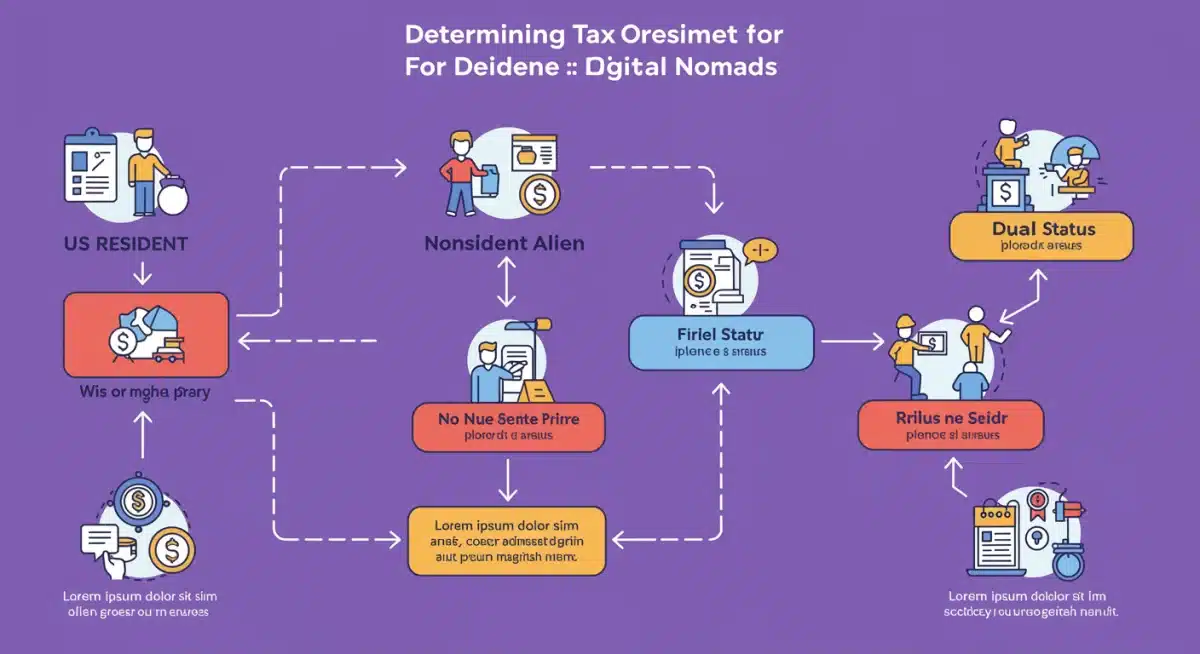Navigating 2025 US Tax Laws: Digital Nomad Compliance Guide

Anúncios
Understanding and complying with 2025 US tax laws for digital nomads is crucial, requiring careful attention to income sourcing, residency rules, and international reporting to ensure seamless financial operations.
For those embracing the freedom of remote work, Navigating 2025 US Tax Laws for Digital Nomads: A 5-Step Compliance Guide for Remote Income is an essential read. The allure of working from anywhere in the world often overshadows the complexities of tax obligations. But as the global economy evolves, so do the rules governing how and where remote workers pay their dues. This guide aims to demystify these regulations, providing a clear roadmap for US digital nomads to ensure compliance and peace of mind.
Anúncios
Understanding Your Tax Residency Status
The first crucial step for any digital nomad is accurately determining their tax residency status. This isn’t always straightforward, as it depends on various factors including your physical presence, domicile, and intent. The IRS has specific criteria that can classify you as a US resident, non-resident alien, or even a dual-status alien, each carrying different tax implications. Misunderstanding your status can lead to significant compliance issues and unexpected tax liabilities.
Your residency status dictates your tax obligations. A US citizen or green card holder is generally subject to US taxation on worldwide income, regardless of where they live or earn it. However, non-resident aliens are typically only taxed on US-sourced income. It’s a nuanced area that often requires careful evaluation of your specific circumstances.
Anúncios
Physical Presence Test vs. Domicile
The physical presence test is one of the primary ways the IRS determines if you are a US resident for tax purposes. This test involves counting the number of days you spend in the United States over a three-year period. If you meet certain thresholds, you are generally considered a resident alien, even if you don’t hold a green card. Domicile, on the other hand, refers to your permanent home, the place you intend to return to eventually. This distinction is vital for digital nomads who might spend significant time abroad but still maintain strong ties to the US.
- Substantial Presence Test: Calculate days in the US over the current year and two preceding years.
- Closer Connection Exception: Even if you meet the substantial presence test, you might be able to claim non-resident status if you can prove a closer connection to a foreign country.
- Green Card Test: Holding a US green card automatically classifies you as a resident alien for tax purposes.
It’s important to keep meticulous records of your travel dates and locations. This documentation will be invaluable if you ever need to prove your residency status to the IRS. Without clear records, you might find yourself in a difficult position trying to justify your tax claims. Consulting with a tax professional specializing in international taxation is highly recommended to navigate these complexities.
Ultimately, accurately identifying your tax residency status is the bedrock of your tax compliance strategy as a digital nomad. It informs every subsequent step, from income reporting to claiming deductions and credits. Taking the time to understand this foundational element can save you considerable stress and potential financial penalties down the line.
Sourcing Your Remote Income Effectively
Once your residency is clear, the next step is to understand how your remote income is sourced. For digital nomads, income sourcing can be particularly intricate. Is your income sourced where your client is located, where you perform the work, or where your business is registered? The answer can significantly impact your US tax liability, especially if you qualify for exclusions or credits.
Generally, income for personal services is sourced where the services are performed. This means if you’re working from a café in Lisbon for a client in New York, your income might be considered foreign-sourced. However, there are exceptions and specific rules for different types of income, such as royalties, dividends, and rental income. Each income stream needs to be evaluated individually.
Distinguishing US-Sourced vs. Foreign-Sourced Income
The distinction between US-sourced and foreign-sourced income is critical for digital nomads. If you are a US citizen or resident alien, you are taxed on your worldwide income. However, foreign-sourced income may qualify for certain exclusions or credits that can reduce your US tax burden. For non-resident aliens, only US-sourced income is generally taxable in the US.
- Personal Services Income: Generally sourced where the services are physically performed.
- Rental Income: Sourced where the property is located.
- Business Profits: Sourcing can be complex, depending on the business structure and location of operations.
Properly categorizing your income is not just about reducing your tax bill; it’s about accurate reporting. The IRS requires specific forms for reporting foreign-sourced income and claiming any applicable exclusions. Inaccurate sourcing can lead to penalties and a reassessment of your tax liability. It’s a common area where digital nomads can make mistakes, often due to a lack of understanding of the nuances involved.
Effectively sourcing your remote income requires a detailed understanding of where your work is performed and the nature of your income. This step is pivotal for leveraging international tax treaties and exclusions, ultimately impacting your overall tax strategy. Keeping a detailed log of your work locations and income types will greatly assist in this process.
Leveraging Tax Treaties and Exclusions
One of the most powerful tools for digital nomads to reduce their US tax burden is the strategic use of tax treaties and exclusions. The United States has income tax treaties with many countries designed to prevent double taxation. These treaties can significantly alter how certain types of income are taxed, and who has the primary right to tax them.
Beyond treaties, the Foreign Earned Income Exclusion (FEIE) and Foreign Housing Exclusion/Deduction are critical for many US citizens and resident aliens working abroad. These provisions allow eligible individuals to exclude a certain amount of foreign-earned income from their US taxable income, and to deduct or exclude certain foreign housing expenses.

The Foreign Earned Income Exclusion (FEIE)
The FEIE allows qualified individuals to exclude a significant portion of their foreign earned income from US taxation. To qualify, you generally must meet either the Bona Fide Residence Test or the Physical Presence Test. The Bona Fide Residence Test requires you to be a resident of a foreign country for an uninterrupted period that includes an entire tax year. The Physical Presence Test requires you to be physically present in a foreign country or countries for at least 330 full days during any period of 12 consecutive months.
- Bona Fide Residence Test: Establish residence in a foreign country for a full tax year.
- Physical Presence Test: Be outside the US for at least 330 full days in a 12-month period.
- Form 2555: This form is used to claim the FEIE and Foreign Housing Exclusion/Deduction.
It’s important to remember that claiming the FEIE means you cannot also claim the Foreign Tax Credit for taxes paid on the excluded income. You must choose the option that provides the greater tax benefit. Additionally, while the FEIE reduces your taxable income, it does not exempt you from filing a US tax return if your income exceeds the filing threshold. Even if you owe no tax, filing is mandatory to claim the exclusion.
Successfully leveraging tax treaties and exclusions requires a thorough understanding of their specific requirements and limitations. These provisions offer substantial relief for digital nomads, but only if applied correctly. Professional guidance can be invaluable in ensuring you maximize your benefits while remaining fully compliant with IRS regulations.
Navigating State Tax Obligations
While federal tax obligations are often the primary concern, digital nomads must also consider their state tax responsibilities. Unlike federal taxes, which generally tax US citizens on worldwide income, state tax residency rules can be even more complex and vary significantly from state to state. It’s possible to be considered a resident of one state for tax purposes even if you spend very little time there.
Many states use factors like driver’s license, voter registration, bank accounts, and property ownership to determine residency. Some states, like Texas, Florida, and Nevada, have no state income tax, making them attractive options for establishing domicile. However, even if you live in a no-income-tax state, you might still owe taxes to another state if you earned income there or have significant ties to it.
Establishing and Maintaining State Tax Domicile
Establishing a clear state tax domicile is crucial for digital nomads. This involves demonstrating a genuine intent to make a particular state your permanent home. It’s not enough to simply claim a state as your domicile; you must actively sever ties with other states and establish new ones in your chosen domicile state. This might include changing your driver’s license, registering to vote, opening bank accounts, and updating your mailing address.
- Physical Presence: Actual time spent in a state can heavily influence residency.
- Intent: Actions demonstrating your intention to make a state your permanent home.
- Severing Ties: Disconnecting from previous states of residence (e.g., closing old bank accounts, canceling memberships).
For digital nomads, maintaining a consistent paper trail proving your domicile is essential. This includes keeping records of utility bills, rent agreements, and any other documentation that links you to your chosen state. Without clear evidence, states may challenge your residency claim, potentially leading to audits and back taxes. The penalties for misrepresenting state residency can be substantial, so accuracy is paramount.
Effectively managing state tax obligations requires careful planning and a clear understanding of individual state laws. By proactively establishing and maintaining a legitimate domicile, digital nomads can minimize their state tax burden and avoid unexpected liabilities. This step is as important as federal tax planning and should not be overlooked.
Understanding International Reporting Requirements
Beyond income tax, US digital nomads have several international reporting requirements that often catch them by surprise. The IRS and the Treasury Department mandate reporting of foreign financial accounts and certain foreign assets, even if those assets do not generate taxable income. Failure to comply with these reporting requirements can result in severe penalties, often far exceeding any unpaid taxes.
The two most common international reporting forms for digital nomads are the Report of Foreign Bank and Financial Accounts (FBAR) and Form 8938, Statement of Specified Foreign Financial Assets. These forms are designed to provide the US government with information about your foreign financial holdings, to combat tax evasion and monitor international financial activity.
FBAR (FinCEN Form 114)
The FBAR is required if the aggregate value of all your foreign financial accounts exceeded $10,000 at any point during the calendar year. This includes bank accounts, brokerage accounts, mutual funds, and even some foreign-issued life insurance policies. The FBAR is filed electronically with the Financial Crimes Enforcement Network (FinCEN), not with your tax return.
- Threshold: Aggregate value of foreign accounts exceeding $10,000 at any time.
- Filing Deadline: Generally April 15th, with an automatic extension to October 15th.
- Penalties: Can be substantial, both civil and criminal, for non-willful and willful violations.
It’s important to note that the FBAR threshold is relatively low, meaning many digital nomads who maintain foreign bank accounts for daily living expenses will likely meet the reporting requirement. Even if you only briefly exceed the $10,000 threshold, you are still required to file. The penalties for non-compliance are severe, so it’s critical to take this requirement seriously.
Form 8938, on the other hand, is filed with your income tax return and has higher reporting thresholds, which vary depending on your filing status and whether you reside in the US or abroad. This form covers a broader range of foreign financial assets, including foreign stocks, partnership interests, and certain foreign trusts. Understanding and complying with both FBAR and Form 8938 is crucial for avoiding hefty penalties and ensuring full international tax compliance as a digital nomad.
Proactive Tax Planning and Professional Guidance
The final and perhaps most critical step for Navigating 2025 US Tax Laws for Digital Nomads is to engage in proactive tax planning and seek professional guidance. The complexities of international taxation, combined with the unique lifestyle of a digital nomad, make a “do-it-yourself” approach risky. A qualified tax professional specializing in expatriate and international tax law can provide invaluable insights and ensure full compliance.
Proactive planning involves more than just filing your taxes on time. It means understanding the implications of your travel plans, income streams, and financial decisions before they happen. This allows you to structure your affairs in a tax-efficient manner, taking full advantage of available exclusions, credits, and treaty benefits without running afoul of the law.
Benefits of Professional Tax Advice
A tax professional can help you navigate the intricacies of residency rules, income sourcing, and international reporting. They can advise on the best strategies for establishing domicile, maximizing foreign earned income exclusions, and ensuring timely and accurate filing of all required forms. Their expertise can save you significant time, stress, and potential penalties.
- Residency Determination: Expert analysis of your specific situation to determine accurate tax residency.
- Optimizing Exclusions: Ensuring you qualify for and correctly claim the FEIE and Foreign Housing Exclusion.
- FBAR/Form 8938 Compliance: Guiding you through the complex international reporting requirements.
Beyond compliance, a good tax advisor can also help you with long-term financial planning. This might include advice on setting up foreign bank accounts, investing in foreign assets, or structuring your business to be more tax-efficient. Their insights can be crucial for digital nomads looking to build a sustainable and financially secure lifestyle abroad.
Ultimately, proactive tax planning and professional guidance are not merely an expense but an investment in your financial well-being and peace of mind. Given the ever-evolving landscape of international tax laws, having an expert by your side is the most reliable way to ensure you remain compliant and optimize your tax situation as a digital nomad.
| Key Point | Brief Description |
|---|---|
| Tax Residency | Crucial for determining US tax obligations on worldwide vs. US-sourced income. |
| Income Sourcing | Determines if income is US or foreign-sourced, impacting exclusions and credits. |
| FEIE & Treaties | Leverage Foreign Earned Income Exclusion and tax treaties to reduce tax burden. |
| FBAR/Form 8938 | Mandatory reporting of foreign financial accounts and assets to avoid severe penalties. |
Frequently Asked Questions About Digital Nomad Taxes
Yes, if you are a US citizen or green card holder, you are generally subject to US taxation on your worldwide income, regardless of where you live or earn it. However, you may qualify for exclusions like the Foreign Earned Income Exclusion (FEIE) or foreign tax credits to reduce your tax liability.
The FEIE allows eligible US citizens or resident aliens working abroad to exclude a certain amount of their foreign earned income from US taxation. To qualify, you must meet either the Bona Fide Residence Test or the Physical Presence Test, demonstrating sufficient time spent outside the United States.
An FBAR (Report of Foreign Bank and Financial Accounts) is required if the aggregate value of all your foreign financial accounts exceeded $10,000 at any point during the calendar year. This includes bank, brokerage, and other financial accounts. It’s filed with FinCEN, not the IRS.
State tax obligations vary significantly and depend on your domicile, not just physical presence. You may still be considered a resident of a US state for tax purposes, even if you spend most of your time abroad. Establishing clear domicile in a no-income-tax state is a common strategy.
Given the complexities of international tax laws, residency rules, and reporting requirements, professional tax advice is highly recommended for digital nomads. An expert can help ensure compliance, optimize tax benefits, and avoid costly penalties, providing peace of mind.
Conclusion
Successfully navigating the intricate landscape of 2025 US tax laws for digital nomads demands diligence, understanding, and often, expert assistance. From correctly determining your tax residency and sourcing your remote income to strategically leveraging tax treaties and meeting international reporting obligations, each step is crucial. Proactive planning and seeking guidance from a qualified international tax professional can transform a potentially overwhelming task into a manageable process, ensuring you enjoy the freedom of your digital nomad lifestyle without the burden of tax non-compliance.





